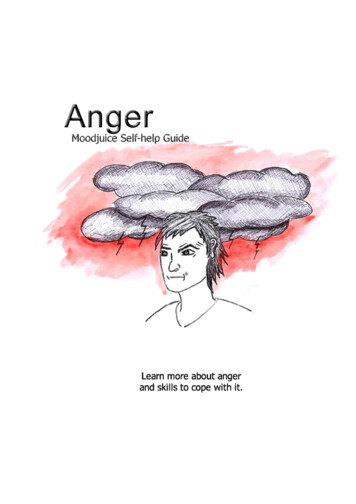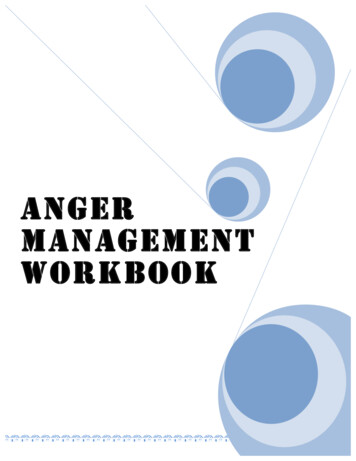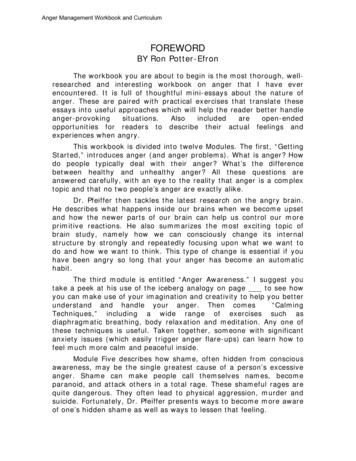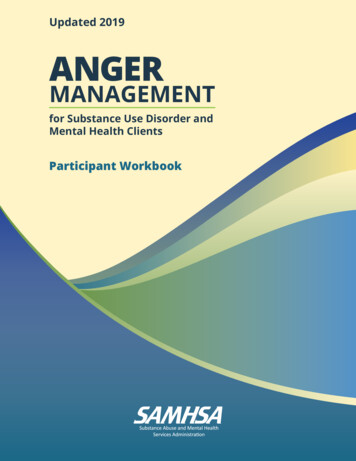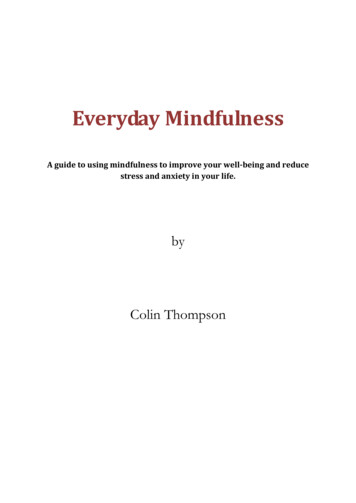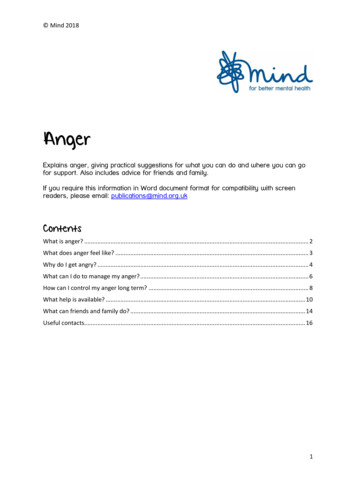
Transcription
Mind 2018AngerExplains anger, giving practical suggestions for what you can do and where you can gofor support. Also includes advice for friends and family.If you require this information in Word document format for compatibility with screenreaders, please email: publications@mind.org.ukContentsWhat is anger? . 2What does anger feel like? . 3Why do I get angry? . 4What can I do to manage my anger? . 6How can I control my anger long term? . 8What help is available? . 10What can friends and family do? . 14Useful contacts. 161
Mind 2018What is anger?We all feel angry at times – it's part of being human. Anger is a normal, healthy emotion,which we might experience if we feel: attackeddeceivedfrustratedinvalidated or unfairly treatedIt isn't necessarily a 'bad' emotion; in fact it can sometimes be useful. For example, feelingangry about something can: help us identify problems or things that are hurting usmotivate us to create change, achieve our goals and move onhelp us stay safe and defend ourselves in dangerous situations by giving us aburst of energy as part of our fight or flight systemMost people will experience episodes of anger which feel manageable and don't have abig impact on their lives. Learning healthy ways to recognise, express and deal withanger is important for our mental and physical health. (Our pages on managing outburstsand long-term coping have some tips on how to deal with anger.)When is anger a problem?Anger only becomes a problem when it gets out of control and harms you or peoplearound you. This can happen when: you regularly express your anger through unhelpful or destructive behaviouryour anger is having a negative impact on your overall mental and physical healthanger becomes your go-to emotion, blocking out your ability to feel other emotionsyou haven't developed healthy ways to express your anger“It feels like there's a ball of fire in the middle of my chest that blurts its way straight outof my mouth and burns the people around me.”What is unhelpful angry behaviour?How you behave when you're angry depends on how well you're able to identify andcope with your feelings, and how you've learned to express them (see our page oncauses of anger for more information).Not everyone expresses anger in the same way. For example, some unhelpful ways youmay have learned to express anger include:2
Mind 2018 Outward aggression and violence - such as shouting, swearing, slamming doors,hitting or throwing things and being physically violent or verbally abusive andthreatening towards others.Inward aggression - such as telling yourself that you hate yourself, denyingyourself your basic needs (like food, or things that might make you happy), cuttingyourself off from the world and self-harming.Non-violent or passive aggression - such as ignoring people or refusing to speak tothem, refusing to do tasks, or deliberately doing things poorly, late or at the lastpossible minute, and being sarcastic or sulky while not saying anything explicitlyaggressive or angry.“My brain goes blank and I absent-mindedly release my anger through physical violencetowards myself or objects around me. I don't realise how destructive I've been untilimmediately afterwards.”If you find you express your anger through outward aggression and violence, this can beextremely frightening and damaging for people around you - especially children. And itcan have serious consequences: it could mean you lose your family, job and get intotrouble with the law. In this case it's very important to seek treatment and support.But even if you're never outwardly violent or aggressive towards others, and never evenraise your voice, you might still recognise some of these angry behaviours and feel thatthey're a problem for you. For example, you turn your anger inwards and self-harm ordeny yourself food.“I internalise anger and punish myself by self-harm.”What does anger feel like?Anger feels different for everyone. You might experience some of the things listed below,and you might also have other experiences or difficulties that aren't listed here.Effects on your body a churning feeling in your stomachtightness in your chestan increased and rapid heartbeatlegs go weaktense musclesyou feel hotyou have an urge to go to the toiletsweating, especially your palmsa pounding headshaking or tremblingdizziness3
Mind 2018Effects on your mind feeling tense, nervous or unable to relaxfeeling guiltyfeeling resentful towards other people or situationsyou are easily irritated'red mist' comes down on youfeeling humiliatedRecognising these signs gives you the chance to think about how you want to react to asituation before doing anything. This can be difficult in the heat of the moment, but theearlier you notice how you're feeling, the easier it can be to choose how to express andmanage your anger.“The best advice I was given was to stop briefly once I am angry to ask myself whatpainful emotion I am feeling in the situation where I became angry. A bit of compassionfor my own pain often stops me from taking that pain out on others.”Why do I get angry?Feelings of anger arise due to how we interpret and react to certain situations. Everyonehas their own triggers for what makes them angry, but some common ones includesituations in which we feel: threatened or attackedfrustrated or powerlesslike we're being invalidated or treated unfairlylike people are not respecting our feelings or possessionsPeople can interpret situations differently, so a situation that makes you feel very angrymay not make someone else feel angry at all (for example, other reactions could includeannoyance, hurt or amusement). But just because we can interpret things differently, itdoesn't mean that you're interpreting things 'wrong' if you get angry.How you interpret and react to a situation can depend on lots of factors in your life,including: your childhood and upbringingpast experiencescurrent circumstances.Whether your anger is about something that happened in the past or something that'sgoing on right now, thinking about how and why we interpret and react to situations canhelp us learn how to cope with our emotions better. It can also help us find productivestrategies to handle our anger.4
Mind 2018(See our page on managing outbursts for more information.)Your childhood and upbringingHow we learn to cope with angry feelings is often influenced by our upbringing. Manypeople are given messages about anger as children that may make it harder to manage itas an adult. For example: You may have grown up thinking that it's always okay to act out your angeraggressively or violently, and so you didn't learn how to understand and manageyour angry feelings. This could mean you have angry outbursts whenever youdon’t like the way someone is behaving, or whenever you are in a situation youdon’t like.You may have been brought up to believe that you shouldn’t complain, and mayhave been punished for expressing anger as a child. This could mean that youtend to suppress your anger and it becomes a long-term problem, where youreact inappropriately to new situations you’re not comfortable with. If you don't feelyou can release your anger in a healthy way, you might also turn this inwards onyourself.You may have witnessed your parents' or other adults' anger when it was out ofcontrol, and learned to think of anger as something that is destructive andterrifying. This could mean that you now feel afraid of your own anger and don'tfeel safe expressing your feelings when something makes you angry. Thosefeelings might then surface at another unconnected time, which may feel hard toexplain.Past experiencesIf you've experienced particular situations in the past that made you feel angry, such asabuse, trauma or bullying (either as a child or more recently as an adult), and youweren't able to safely express your anger at the time, you might still be coping with thoseangry feelings now.This might mean that you now find certain situations particularly challenging, and morelikely to make you angry.Sometimes your present feeling of anger may not only be about the current situation butmay also be related to a past experience, which can mean that the anger you are feelingin the present is at a level that reflects your past situation.Becoming aware of this can help us to find ways of responding to situations in thepresent in a safer and less distressed way.Current circumstances5
Mind 2018If you're dealing with a lot of other problems in your life right now, you might find yourselffeeling angry more easily than usual, or getting angry at unrelated things.If there's a particular situation that's making you feel angry, but you don't feel able toexpress your anger directly or resolve it, then you might find you express that anger atother times.Anger can also be a part of grief. If you've lost someone important to you, it can behugely difficult to cope with all the conflicting things you might be feeling. CruseBereavement Care can offer support and information in this situation.(For more information on organisations that can help with your anger see our page onuseful contacts.)“Breathing techniques have helped me to control my anger. I know that if I take a momentto concentrate on my breathing and not my anger, I'll have something else to focus on.”What can I do to manage my anger?It can be frightening when your anger overwhelms you. But there are ways you can learnto manage your anger when you find yourself in difficult situations. You can: look out for warning signsbuy yourself time to thinktry some calming techniquesRemember: if your outbursts can be violent or abusive this can cause seriousproblems in your life and relationships, and can be very damaging to the peoplearound you. In this case, it's essential to seek professional treatment and support foryour anger.Look out for warning signsAnger can cause a rush of adrenaline through your body, so before you recognise theemotion you're feeling you might notice: your heart is beating fasteryour breathing is quickeryour body is becoming tenseyour feet are tappingyou're clenching your jaw or fistsRecognising these signs gives you the chance to think about how you want to react to asituation before doing anything. This can be difficult in the heat of the moment, but the6
Mind 2018earlier you notice how you're feeling, the easier it can be to choose how to manage youranger.“Breathing techniques have helped me to control my anger. I know that if I take a momentto concentrate on my breathing and not my anger, I'll have something else to focus on.”Buy yourself time to thinkSometimes when we're feeling angry, we just need to walk away from the situation for awhile. This can give you time to work out what you're thinking about the situation, decidehow you want to react to it and feel more in control. Some ways you can buy yourselftime to think are: Counting to 10 before you react.Taking yourself out of the situation by going for a short walk – even if it's justaround your block or local area.Talking to a trusted person who's not connected to the situation, such as a friend,family member, counsellor or peer support group. Expressing your thoughts outloud can help you understand why you're angry and help calm you down. If youdon't feel comfortable talking to someone you know, you can confidentially call theSamaritans 24 hours a day to talk about anything that's upsetting you. (For otherorganisations that can help please see our useful contacts page.)“What helps me is getting away from the situation to cool down.”Try some techniques to manage your feelingsThere are many ways to calm down and let go of angry feelings, depending on what suitsyou and what’s convenient at the time you are angry. Breathe slowly – try to breathe out for longer than you breathe in and focus oneach breath as you take it.Relax your body – if you can feel your body getting tense, try focusing on eachpart of your body in turn to tense and then relax your muscles. (See our pages onrelaxation for more tips on how to relax.)Try mindfulness techniques – mindfulness can help you to be aware of whenyou're getting angry and can help calm your body and mind down. Be Mindful hasmore information on mindfulness and guidance on how to practice it. (See ourinformation on mindfulness to learn more.)Exercise – try to work off your anger through exercise. Sports like running orboxing can be really helpful for releasing pent up energy.Use up your energy safely in other ways – this can help relieve some of yourangry feelings in a way that doesn't hurt yourself or others. For example, youcould try tearing up a newspaper, hitting a pillow or smashing ice cubes in a sink.Do something to distract yourself mentally or physically – anything that completelychanges your situation, thoughts or patterns can help stop your anger escalating.For example, you could try:7
Mind 2018oooooputting on upbeat music and dancingdoing something with your hands, like fixing something or makingsomethingdoing something creative like colouring or drawingwriting in a journaltaking a cold showerRemember: Learning new techniques to help manage your feelings can take time andpractice - so try to be patient and gentle with yourself as you learn these new skills.How can I control my anger long term?If you think about how to manage your anger when you're feeling calmer, you can avoidfeeling overwhelmed by it in the heat of the moment. In particular, you can: learn your triggersexamine your thought patternsdevelop your communication skillslook at your lifestyleLearn your triggersUnderstanding what sort of situations trigger your anger means you can developstrategies to cope and think about how to react before the situation happens. You mightfind it helpful to keep a diary or make notes about the times you have felt angry. Youcould record: What were the circumstances?Did someone say or do something to trigger your anger?How did you feel?How did you behave?How did you feel afterwards?If you do this for a while, you might start to see patterns emerging. You could do thisyourself using a mood diary (many are available online for free, see our useful contactspage for suggestions), or you could find a professional therapist to help you – see ourpage on treatment and support.“Over time I have been able to spot certain triggers, which then enables me to look atmyself and choose a healthier path.”Examine your thought patterns8
Mind 2018If you're feeling upset or angry, you might find yourself automatically thinking or sayingthings like: "This is all their fault.""They never listen.""This always happens to me.""Other people should behave better."But often there are lots of different ways we could interpret a situation. It can make youfeel worse if you think in terms of 'always', 'never' and 'should', because in reality thingsare rarely so black and white. Making an effort to replace these words with softer termslike 'sometimes' or 'could' when thinking about your situation might help you to break upnegative thought patterns, reflect more calmly on your situation and find new waysthrough conflicts.“The best advice I was given was to stop briefly once I am angry to ask myself whatpainful emotion I am feeling in the situation where I became angry. A bit of compassionfor my own pain often stops me from taking that pain out on others.”Develop your communication skillsBeing excessively angry and aggressive can get in the way of communicating yourfeelings and thoughts effectively. People may focus on your anger, and find it hard tolisten to what you're saying. On the other hand, if you are able to express your anger bytalking in an assertive, respectful way about what has made you angry, then you're morelikely to be understood by others.Being assertive means standing up for yourself while still respecting other people andtheir opinions. It can: make communication easierstop tense situations getting out of controlbenefit your relationships and self-esteemLearning to be assertive might not feel easy to start with, but here are some things to try: Think about the outcome you want to achieve. What's making you angry, and whatdo you want to change? Is it enough just to explain what you are angry about?Be specific. For example, you could open your statement with, “I feel angry withyou because.” Using the phrase ‘I feel’ avoids blaming anyone and the otherperson is less likely to feel attacked.Really listen to the other person's response and try to understand their point ofview.Be prepared for the conversation to go wrong and try to spot when this ishappening. If you feel yourself getting angry, you might want to come back to theconversation another time.9
Mind 2018The organisation MindTools provides tips on respectful assertiveness on their website.“What helps me is acknowledging how I'm feeling and why, then taking time to address itproductively.”Look at your lifestyleLooking after your wellbeing more generally could help you feel calmer and more incontrol when things happen that make you feel angry. You might want to: Avoid drugs and alcohol. Although you might feel this could help you cope in theshort term, alcohol and drugs can both affect your ability to control your emotionsand actions, and can be a factor in violence. For information and support to stopusing drugs or alcohol you can contact Turning Point or Alcoholics Anonymous.See our pages on the mental health effects of alcohol and street drugs for moreinformation.Be more active. Being active can help let out any tension you're feeling, as well ashaving benefits to your self-esteem. Even gentle exercise like going for a walk canmake a difference. See our pages on exercise for more information.Get good sleep. Not sleeping well can have a huge impact on how we're feeling,and how well we cope with things that happen to us. See our pages on sleepproblems for more information.Look at what you're eating and drinking. See our pages on food and mood formore information.Learn to deal with pressure. We can feel pressured or stressed for lots of differentreasons, but taking some time to learn how to deal with pressure can help us feelmore in control of difficult situations. See our page on dealing with pressure formore information.Develop your emotional resilience. Emotional resilience helps us feel more able tohandle difficult emotions. See our page on developing resilience for moreinformation.“Exercise is the best thing to manage my anger. It transforms my mood!”What help is available?There are various treatments available that can help you with your anger problems. Ifyour difficulties with anger are related to a mental health problem and/or traumaticexperiences then you might find that treatment and support for this also addresses youranger. (See our A-Z of mental health for information on treatments and support fordifferent diagnoses and experiences).Talking therapy and counselling10
Mind 2018Talking therapy and counselling involves talking about your problems with a trainedprofessional (such as a counsellor or psychotherapist) who can help you explore thecauses of your anger and ways to manage it. This can help you work through yourfeelings and improve your responses to situations that make you angry.There are different types of talking therapies, and some are specifically tailored to angerissues. Counselling is usually a short-term treatment where you might talk through aspecific issue – such as outbursts of anger with your partner or in the workplace –and try to understand how you could manage those situations differently. Someworkplaces, higher education institutions, local charities and GP surgeries offerfree or low-cost counselling services to their employees, students or localresidents.Psychotherapy often lasts longer than counselling and tends to go deeper into pastexperiences. Your focus here may be on learning more about yourself to help youunderstand why you express your anger the way you do, or why certainsituations make you angry.Cognitive behavioural therapy (CBT) is highly structured short-term talking therapythat examines how your thoughts, feelings and behaviours affect each other, andaims to teach you practical skills to change this. CBT is the most commonly offeredtalking treatment on the NHS. You could also try to learn CBT techniques byyourself through accessing self-help books from your local library, or onlinethrough free apps.For more information about different kinds of talking treatments and how they can help,see our pages on talking therapies.Talking, talking, talking over many years has helped immensely. Now I don't bottle it all upinside.How do I access these treatments?To access most treatments, the first step is usually to talk to your GP.In some areas, you can also self-refer for counselling through the NHS Improving Accessto Psychological Therapies (IAPT) programme.(See our pages on seeking help for a mental health problem for tips on how to talk toyour doctor about your mental health.)Anger can be a barrier to getting helpAccessing professional help isn't always straightforward; it can be challenging andsometimes you might experience setbacks or delays. It's understandable that you11
Mind 2018might sometimes feel frustrated and angry about your situation – especially if youdon't feel you're getting the help you want.But if you express your anger aggressively towards your healthcare professionals,this can cause more problems and delays in getting the help you want. Healthcareprofessionals have a right to feel safe at work; so if your behaviour becomesaggressive or threatening, they may not feel able to help you.(See our pages on managing outbursts and long-term coping for some techniquesyou can use to manage angry feelings. If you feel you've been unfairly refusedtreatment, see our pages on complaining about health and social care for moreinformation on what you can do.)I get angry when I don't get the help I need. That worsens my mental health so I feel moreanxious and frustrated.Anger management programmesThese are a specific kind of talking treatment for people who struggle with anger issues.They often involve working in a group, but may involve one-to-one sessions. They mayuse a mixture of counselling and CBT techniques. You can try: NHS anger management courses. Many NHS Trusts run free local angermanagement services – you can ask your GP what's available near you.Local Mind anger management courses. Some local Minds also provide freecounselling or anger management services. Contact your Local Mind directly andask them what services they provide.Online self-help. Some organisations have produced online self-help guides formanaging anger (see our page on useful contacts for more information).A private course or therapist specialising in anger. You can use the BritishAssociation of Counselling and Psychotherapy's (BACP) website to search foraccredited therapists near you. See our pages on talking therapies for moreinformation about private therapy.Help for abusive and violent behaviourIf your anger means you're acting in an abusive or violent way it's important to get help.You might feel worried that asking for help will get you in trouble, but it is often the mostimportant first step towards changing your behaviour. You can contact: Your GP. They can talk through your options with you, and refer you on to anylocal services. In many areas, the NHS, social services or your local council willrun programmes to help perpetrators of domestic abuse change theirbehaviour.12
Mind 2018Respect runs a phoneline offering advice, information and support on 0808 8024040. You can also email them on info@respectphoneline.org.uk or use their livechat on their website. Live chat is available Tuesdays and Thursdays 10 am-4 pm.They run programmes across the country to help you understand and changeyour behaviour.The Freedom Programme runs online and in-person courses for anyone whowants to change their abusive behaviour.The Alternatives to Violence Project (AVP) runs courses to help people learn newways to tackle situations where violence could arise. Local support ADAPT is a course run across Hampshire and the Channel Islands to supportmen over 18 to change abusive or violent behaviour.The Everyman Project has information, self-help strategies and programmesbased in London to help perpetrators of domestic abuse. They also run anadvice line on 020 7263 8884.The Domestic Violence Intervention Project offers support to stop domesticabuse across London and the south east.Atal y Fro runs a free programme for male perpetrators of domestic abuse inthe Vale of Glamorgan. It is also available to people outside this area for afee.The Phoenix Respect Programme For Men is run by Gwent Domestic AbuseServices for men who have been or are at risk of being abusive to theirpartners.Bridging to Change is a Manchester-based service for perpetrators ofdomestic abuse.The South Tyneside Domestic Abuse Perpetrators Programme helps menliving in South Tyneside to change abusive behaviour.The BRAVE project is a not-for-profit organisation based in Bradford whichoffers a confidential service comprising group work, one-to-one counsellingand telephone support for men to help change abusivebehaviour.The Pennine Domestic Violence Group provides information and runs aprogramme of support for perpetrators of domestic abuse in the Penninearea.Please note: Mind does not endorse any particular support service, including those listed onthis page. We have no knowledge of their services orperformance.This is not an exhaustive list. You may be able to find other services nearyou.13
Mind 2018 It is your responsibility to decide whether the service you are consideringusing is appropriate for you.What can friends and family do?This section is for friends and family of someone who is experiencing problems withanger.It can be very difficult when someone you care about is experiencing problems with anger– especially if they sometimes direct their anger towards you, others close to them, orthemselves.We are all responsible for our own actions, so ultimately it will be up to them to learn howto manage and express their anger appropriately. But there are still lots of things you cando to help support them: Stay calm. Although you probably have a lot of difficult feelings of your own, if youcan stay calm it can help to stop anger escalating.Try to listen to them. If you can, allow them time to communicate their feelingswithout judging them. Often when someone feels that they are being listened to,they are more able to hear other people's points of view as well. And sometimesjust being given permission to communicate angry feelings can be enough to helpsomeone calm down.Give them space. If you notice that continuing the conversation is making it worse,give them space to calm down and think. This could be something like going intoanother room for a while, or spending a few days apart. It's important to giveyourself space as well, so you don't find yourself getting too angry.Set boundaries. While there are lots of reasons why this can be difficult, it'simportant to set limits and boundaries. Be clear in advance about what sort ofbehaviour is and isn't acceptable to you, and think about what action you can takeif someone crosses the line. You don't have to put up with any behaviour thatmakes you feel unsafe or seriously affects your own wellbeing.Help them identify their triggers. This is something you can try when you're bothfeeling calm, away from any heated situation. Identifying someone's triggers foranger can help you both think about ways you can avoid triggering situations, andplan how to handle them and how to communicate when they do arise. But try notto be judgemental, or accusatory. While it can be useful to give specific examplesof when you remember them getting angry, be aware that this is probablyupsetting for them to think about.Support them to seek professional help. For example, you could help them arrangeto see their GP, or help research anger management courses. See our pages ontreatments for anger and supporting someone to seek help for their mental healthfor more information.14
Mind 2018 Look after your own wellbeing. It can be difficult at times to support someone else,so make sure you're looking after your own wellbeing too. (See our information onHow to cope when supporting someone else for more on this.)“The worst thing is for people to tell me to calm down or say that whatever caused myanger doesn't matter. People listening and accepting my feelings (even if my anger seemsunprecedented) helps the most.”What if their behaviour is abusive or violent?Just because someone seems very angry, it doesn't necessarily mean that they willbecome violent or abusive. But if this does happen, the most important thing is to makesure that you are safe. Don't confront someone who
Anger Explains anger, giving practical suggestions for what you can do and where you can go for support. Also includes advice for friends and family. If you require this information in Word
